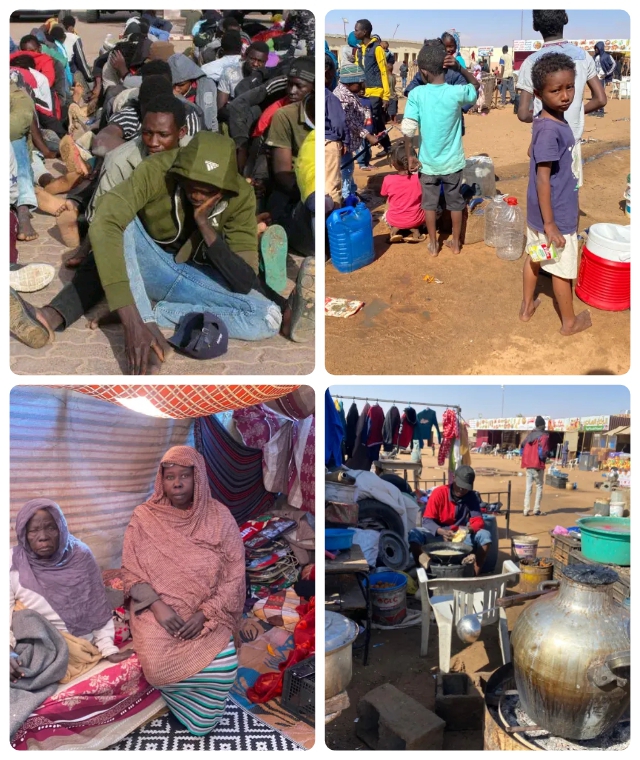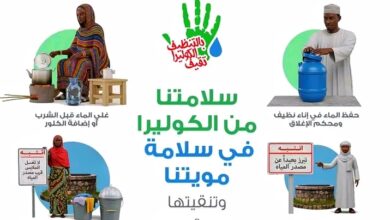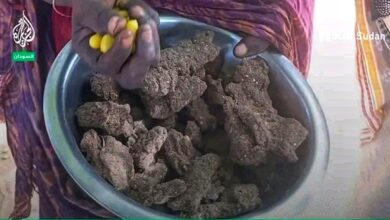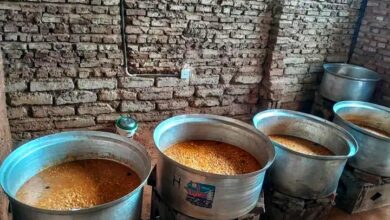
In one of the nights of April 2023, while the sound of shells tore through the quiet of El Fasher, North Darfur, Tamader Al-Nour, a mother of three, held her children close. “The war is merciless, and hunger is threatening their lives,” she told Al-Hurra.
Her husband, who had stayed with her throughout their displacement, tried to find any means of escape from Sudan. After their situation worsened and El Fasher turned into a battlefield unfit for living, they had no choice but to flee.
They gathered their remaining little money and prepared for a perilous journey to Libya, where they were told there was a chance for a safer life.
The war in Sudan began in mid-April 2023, leaving catastrophic humanitarian effects. Thousands of civilian casualties were reported, and millions were displaced both internally and externally.
The Escape to Kufra
In an old truck crowded with refugees, Tamader, her husband, and children embarked on a journey across the Sahara Desert in August of that year. The heat was unbearable, the water scarce, and fear of bandits and militias gnawed at their hearts.
Whenever Tamader felt hopeless, she looked into her children’s eyes and drew strength from them. Her husband held her hand, reassuring her that “this hardship will pass.”
After days of suffering, they arrived at the Libyan city of Kufra, the main entry point from Sudan, about 350 kilometers from the closest Sudanese border. In 2024, the number of Sudanese refugees seeking safety in Libya had doubled, with an estimated 400 refugees arriving in the country daily, according to the UN Refugee Agency.
Soon, Tamader’s family discovered that Kufra was teeming with human traffickers and armed groups, and Sudanese refugees were being treated harshly. They barely found a place to stay, sleeping in a shared storage room with other families who had fled from various areas.
The next morning, along with others, they paid a smuggler to take them to the Libyan capital, Tripoli. They were stopped by armed men at several checkpoints.
Tamader said, “They would force us off and humiliate us, especially at the Ajdabiya checkpoint in eastern Libya, demanding extra money for us to pass.” They paid the equivalent of 100 US dollars to get through, finally reaching Tripoli in the west.
First Detention
Upon arriving at the UN Refugee Agency’s office, they barely managed to register their names, and each family received 500 Libyan dinars (about 101 US dollars), according to Tamader. “This amount isn’t enough to rent a house for one month, so we used it for food and drink.”
With no place to stay, they found themselves in front of the agency’s office with dozens of other Sudanese. It wasn’t long before Libyan security forces raided the area due to overcrowding of migrants.
Dozens of refugees, including Tamader and her family, were arrested and taken to the Abu Salim prison.
“They forced us to strip completely, even the children, under the pretext of a search. When we protested, they beat us. I have marks on my body from their beatings,” said Tamader.
The nights in prison were slow and filled with fear. Tamader witnessed security officers beating some detainees and heard the screams of women being interrogated in degrading ways.
She tried to stay strong for her children, who cried from hunger and cold.
In prison, they were accompanied by a Sudanese woman with her seven children, the oldest of whom was an 18-year-old girl. The woman suffered from diabetes and was unable to eat the food provided—just bread or rice.
This woman now lives with Tamader and her family, suffering from severe health issues due to what happened to her in prison.
After 30 days of suffering and detention, they were released after the UN Refugee Agency intervened, providing them with 900 dinars (around 190 US dollars) to find shelter.
They shared a house with other Sudanese families, renting a three-room apartment, with each room housing seven people.
Tamader said, “It’s better than being on the street and getting arrested again.”
Her husband tried to find permanent work, but he was unsuccessful due to not having passports.
They stayed in the rented house for less than a month before security forces arrested them again.
The arrest followed a complaint from neighbors, who said, “The house has too many Sudanese people.” This time was worse than the first. Security forces forced her to strip, even though she was menstruating.
Her attempts to plead with them to stop the humiliating procedures, which included sexual harassment, were unsuccessful.
Inside the detention center, there was almost no food. The children became ill without any medical care.
After six days, the Sudanese embassy intervened and helped them get released from prison.
Tamader and her family cannot return to El Fasher, where the war continues. Her father was killed there by Rapid Support Forces’ airstrikes four months earlier.
Enormous Difficulties
While estimates suggest that over 210,000 Sudanese have arrived in Libya since the war began, the UN Refugee Agency expects the number to reach around 450,000 by the end of the year.
In late December, Asir Al-Mudaeen, head of the UN Refugee Agency’s mission in Libya, said: “Refugees in Libya have endured enormous hardships in their journey here. As we enter a new year, we must act quickly to prevent further suffering and protect lives.”
The Libyan Anti-Illegal Migration Authority issued a final warning to companies across the country last month, urging them to regularize the status of their foreign workers.
After the arrival of over 200,000 Sudanese, calls for assistance to Libya in managing the migration crisis have increased.
Exploitation
Tariq Lamloom, a researcher in irregular migration, told Al-Hurra that “Libya is in a state of chaos regarding the treatment of irregular migrants.”
“There are many announcements about the need to regularize their status, but on the ground, many officials are involved in illegally exploiting them,” said Lamloom.
He also noted that “those who do maintenance and cleaning work, even in prisons, are irregular migrants. Even in ministries, these workers fill positions, but they are not registered legally.”
Lamloom pointed out that “these migrants often find themselves victims of human trafficking, living in harsh conditions in detention centers, where they are financially exploited by authorities and armed groups.”
In prisons, migrants face arbitrary detention, with constant threats that they will remain imprisoned until they pay large sums for their release, according to Lamloom.
Some are unable to get out until they pay up to 1,500 US dollars, which exacerbates their suffering, especially given the deteriorating economic situation in Libya.




